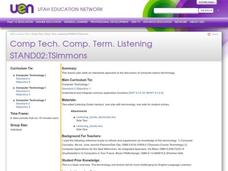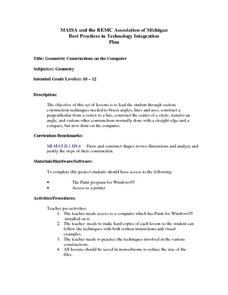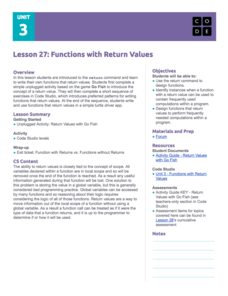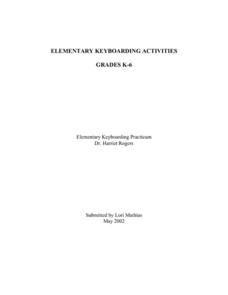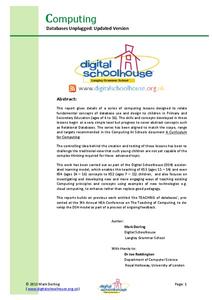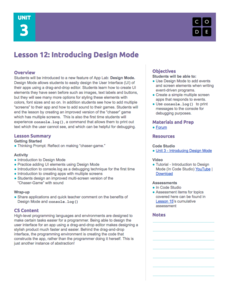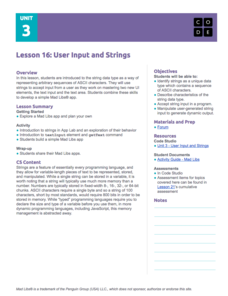Curated OER
Technology in 2nd Grade
Second graders explore ways to use computers. They practice spelling words using Kid Pix software, write Bible verses and illustrate them. They read stories and illustrate and write about their favorite characters. They create pattern...
Curated OER
Computer Terminology
Students review the history of computer technology and how much it has changed over time. In groups, they examine the different looks of technology from the past to today and are introduced to computer terminology. Individually, they...
Curated OER
Computer Technology Bingo
Students review new vocabulary from their computer technology class. In groups, they participate in a bingo game in which they define terms from a worksheet. They are assessed based on an attached rubric and discuss any terms they are...
Curated OER
Information Technology
Students identify various threats to computers today. In this technology lesson, students explore various techniques to address security issues. They demonstrate what they have learned using classroom computers.
Curated OER
Learning Computer Skills
Students discuss their computer skills. They compare where they learned them, if boys learn them more easily, if they plan to become computer professionals, and differences in how boys and girls go about solving computer questions.
Curated OER
Best Practices in Technology Integration
Students go through various construction techniques needed to bisect angles, lines and arcs, construct a perpendicular from a vertex to a line, construct the center of a circle, transfer an angle, and various other constructions normally...
Curated OER
What's The Solution With Technology
Students investigate the use of technology and how it could be used to solve problems. They conduct research using the resource links included in the lesson plan. The teacher chooses a problem for students to solve and leads them to the...
Curated OER
Computer Trouble?
Fifth graders, while in the computer lab, view a PowerPoint presentation on troubleshooting problems with a computer. They are guided through some common problems that fifth graders may encounter and should be able to solve prior to...
Curated OER
Mathematics and Computers
Seventh graders discuss computers and their makers. In this lesson, 7th graders choose a mathematician of their choice and discuss how they impacted our world. They research a favorite mathematician based on tiers.
Curated OER
Dolls for Computers
Studenst explore their own culture by making handcrafts, participating in ballet and thethre. They make dolls and describe the process of making them through technology.
Curated OER
The Introduction and Diffusion of Household Technology
Students conduct research and develop a matrix demonstrating the introduction and spread of common household items from 1900 to 2000 in the U.S. They conduct Internet research, watch and discuss a video, and develop the matrix.
Code.org
Functions with Return Values
Young computer scientists explore how to use the return command in computer programing by playing Go Fish. They learn about functions that return values and then write a turtle driver app using the return function.
Beauty and Joy of Computing
Building Your Own Blocks
Isn't building with blocks an activity for toddlers? The third lab of a five-part unit teaches young computer scientists how to create their own block instructions for programming. They use these blocks to create geometric figures, spell...
Drexel University
Learning Roomba Module 3: Controlling Movement
Look at it go. The resource, the third in a series of five using a Roomba, explains the different types of movements a Roomba makes, then challenges pupils to create computer codes that will cause the Roomba to travel specific paths.
Code.org
Practice Performance Task - Security and Hacking in the Real World
Young computer scientists create a visual artifact that represents their research into a computing innovation in the world of cybersecurity. They then work individually to write an essay on the impact of technology on cybersecurity.
Curated OER
Elementary Keyboarding Activities
Listen to the sound of children's fingers flying across their keyboards as they perform these fun typing lessons. From creating alphabet books and multimedia presentations to researching presidents and writing class...
Computer Science Unplugged
Computing: Databases Unplugged
How do databases store and retrieve information? The activities in the resource provide fundamental concepts of databases by introducing an approach that teaches the basics without using computers. The pupils act as the actual data...
Beauty and Joy of Computing
Conditional Blocks
If you use the resource, then pupils will understand conditional block instructions. In the first lab of a six-part unit, pupils learn how to use conditional statements (if/then) in block instructions for computer programming. They apply...
Beauty and Joy of Computing
Building an App
Create your own app with the first lab of a five-part unit. Future computer scientists learn the basics of programming a game application. They use a given software program to design an app where users try to click on a moving...
Code.org
Introducing Design Mode
Move beyond buttons when designing user interfaces. In the fourth installment of a 21-part unit, young computer scientists learn to apply design mode, which gives users options for colors, fonts, etc. They learn to incorporate these...
Code.org
User Input and Strings
Pupils learn to apply strings in computer science. They master two new user interface elements and also use string type data to represent ASCII characters. Finally, individuals create an app for Mad Libs in the eighth activity of the...
Code.org
Events Unplugged
Introduce event-driven programming. Young computer scientists learn the meaning of event-driven programming and how it is different from previous styles of programming. They play a card game to simulate the challenges that occur in this...
Microsoft
Conditionals
The conditions are ripe to learn about conditionals. Young computer scientists consider conditionals in their daily lives, then apply their knowledge to computer coding. The fifth of nine parts in the Intro to CS with MakeCode uses...

